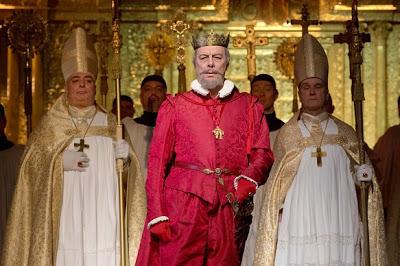by Paul J. Pelkonen
Ferruccio Furlanetto (in red) as Philip II in Act III of Verdi's Don Carlo.
Photo by Ken Howard © 2013 The Metropolitan Opera.
For these performances, the Met brought back 82-year old former New York Philharmonic music director Lorin Maazel for his first conducting gig at the Met since a 2008 run of Die Walküre. On Monday night, Mr. Maazel led a troubled performance. Sluggish tempos predominated, with none of the spring and snap needed to make this massive opera move forward. On the plus side, the conductor was accurate and within the lines, leaving room for his singers to expand notes and melodies as needed. But he failed to pick up the slack elsewhere. The result was a flabby Fontainebleau scene that made one long for Verdi's 1882 four-act version, which omits the whole first act.
The problems grew worse in Act III, with the massive auto-da-fé that depicts both the coronation of King Philip and the cruelty of the Spanish Inquisition. The big choral themes plodded at a turgid pace that was again, musically accurate but dramatically uninspired. Matters improved in Act Four and Five, which are predominantly carried by the singers, but the damage had been done. Mr. Maazel became the first conductor in this writer's memory to be booed from the house...twice.
The singers did what they could. In the title role Ramón Vargas proved that he still has some beautiful notes, but there is no freshness in the rarefied air above the stave. He improved as the evening went on, and proved exceptional in the long Act II duet with Elisabeth. In that role, Barbara Frittoli (a replacement for the originally scheduled Sondra Radvanovsky) was overtaxed. However, she made the most of her resources, singing with beautiful tone in the Act II duet and summoning a credible "Tu che la vanità" in Act V which probed the role's psychological complexities.
The best thing about this revival is the return of Ferruccio Furlanetto as Philip, a towering portrayal of the Spanish despot. Self-doubt, the weight of responsibility and the sense of regal command were present in every scene, delivered in a secure, burly basso with all the low notes intact. He was matched in evil by the Grand Inquisitor of Eric Halfvarson. Their scene in Act IV was one of the evening's major highlights, as church defeats state in a duet for two basses. A third, Miklós Sebestyén made the most of two brief appearances as the Monk.
Virtue is present at the Spanish court in the person of Rodrigo, the Marquis of Posa. He was played by Dmitri Hvorostovsky. His presence provided a badly needed boost to the second act, first in the big friendship duet with Mr. Vargas and his courtly gavotte with the inquisitive Princess Eboli. The Verdi veteran held his own in the Act II dialog with Philip and in the climactic trio that opens Act III. For once, Posa's death scene did not seem drawn out, thanks to sensitive performances from Mr. Hvorostovsky and Mr. Vargas.
Eboli was played by Anna Smirnova, whose apparent weight loss has not affected the power and flexibility of her large mezzo instrument. Despite the slow tempo set by Mr. Maazel, she made the Song of the Veil engaging, flirting with Tebaldo (Jennifer Holloway) and seducing the audience with dusky low notes and pin-point ornamentation. With "O don fatale", Ms. Smirnova nearly blew down the looming gray walls of the set. She energized the whole second part of the opera, presenting Eboli's emotional turmoil and dramatic narcissism in a tour de force. It was the most Verdian moment of a very long evening.


